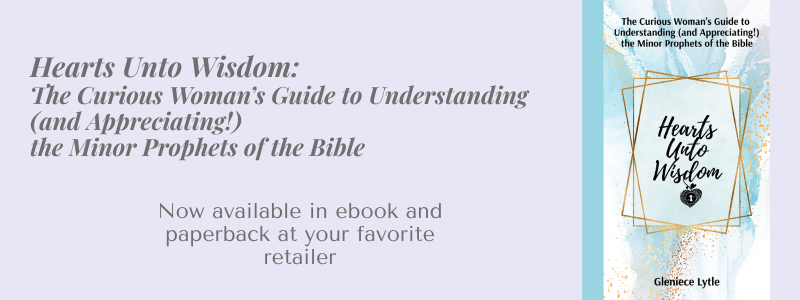Did you know your name is written in God’s book?
Then they that feared the Lord spake often one to another: and the Lord hearkened, and heard it, and a book of remembrance was written before him for them that feared the Lord, and that thought upon his name. (Malachi 3:16)
How thrilling it is (and quite sobering) to know our names are written in His book, but not everyone’s name will be found there—only those who fear the Lord.
The people of Malachi’s day complained that serving God was in vain (Malachi 3:14–15). “What profit do we get out of it?” they said. In their rebellion, the proud were considered happy, those that did wickedly were exalted, and those that tempted or mocked God were encouraged.
Malachi records the lack of fear the inhabitants of Jerusalem had for God. Their sacrificial offerings were laced with contempt and then they wondered why God was displeased. They couldn’t fool Him with their half-hearted offerings. Nor can we.
I know thy works, that thou art neither cold nor hot: I would thou wert cold or hot.
So then because thou art lukewarm, and neither cold nor hot, I will spue thee out of my mouth. (Revelation 3:15–16)
Welcome to Hearts Unto Wisdom
A Bible Study of the Minor Prophets
I thank you for joining me as I share biblical insight into the twelve books commonly referred to as the “Minor Prophets.” These Old Testament books, starting with Hosea and ending with Malachi, are minor only in regard to their length, and not because they lack significance.
So teach us to number our days, that we may apply our hearts unto wisdom. (Psalm 90:12)
[Words in bold or italics added for emphasis to Bible verses throughout this study.]
Malachi
The book of Malachi was written 50 years after the ministries of Haggai and Zechariah had ended. The destroyed temple at Jerusalem, which the previous captives had bewailed, had been rebuilt for 86 years and the residents had grown weary in serving God (again).
The name Malachi means “ministrative” which is an act of serving or aiding like a prophet, messenger, or angel would.
In Malachi, when God speaks the truth about the sins of the priests and all the people, He repeats the phrase “Yet ye say,” or “Ye say” thirteen times! He knows what their retort will be. God knows what everyone is thinking in their hearts or saying outright. He knows their excuses. All the complaints and challenges, the doubtful questionings, the derisions based on their own corrupt feelings and judgments are known.
We often, like the Israelites, look on things from our worldly standards and not from God’s. We see with dull eyes. But when we begin to trust God in everything, our vision become more clear. Things that don’t make sense—and may never while we’re alive—can be handed to God with complete faith that He knows what He’s doing.
God’s judgment against Esau (Esau became the nation of Edom) might seem unfair to us, but God knew what He was doing when He chose Jacob from the womb of Rebekah.
In Malachi 1:6, God appeals to our sense of right and wrong when He says if a son honors his father and a servant his master and if God is our Father, the ultimate Father, then where is His honor? If God is our Master, and He rightly is, where is His respect?
He specifically calls out the priests for their hypocrisy. “O Priests, who despise my name” (Malachi 1:6). But how have we despised you, they say? Once again, God knows their excuses and counterpoints. They despise God by how they live and what they speak and what they teach. They despise Him by regarding the table of the Lord as contemptible (having no reverence or thankfulness in serving Him) and regarding it as polluted (saying what is good is not). They offered polluted sacrifices and expected God to be pleased.
And if ye offer the blind for sacrifice, is it not evil? and if ye offer the lame and sick, is it not evil? offer it now unto thy governor; will he be pleased with thee, or accept thy person? saith the Lord of hosts. (Malachi 1:8)
Offer second-rate gifts to your important leaders and see what happens, God says. Yet, they wouldn’t dare! It would be an affront, an insult to their leaders. So why do they do it to God?
Will a man rob God? Yet ye have robbed me. But ye say, Wherein have we robbed thee? In tithes and offerings. (Malachi 3:8)
How do we rob God of tithes and offerings now that the Levitical priesthood has been fulfilled in Christ? By holding back ourselves from doing good when we have the means to do it. By holding onto our selfish ways and clinging to our comfort zones.
“But to do good and communicate [to share, associate, to participate in social intercourse] forget not: for with such sacrifices God is well pleased” (Hebrews 13:16). Serving people with all their quirks and foibles can be annoying and troublesome at times, but that’s what sacrifice means.
God promises that when we offer ourselves, when we sacrifice our time, money, and self for another, He will fill us to overflowing (Malachi 3:10)!
But this I say, He which soweth sparingly shall reap also sparingly; and he which soweth bountifully shall reap also bountifully. Every man according as he purposeth in his heart, so let him give; not grudgingly, or of necessity: for God loveth a cheerful giver. (2 Corinthians 9:6–8)
The Israelites said, “What a weariness!” to serve God (Malachi 1:13). But we are told in Galatians 6:9, let us not be weary in well doing: for in due season we shall reap, if we faint not.
They balked at presenting God with unblemished flocks; but we are told to present our bodies as a living sacrifice (Romans 12:1). We can’t offer ourselves half-heartedly and expect God to be pleased. We can’t withhold what we can give and expect God not to know (Malachi 1:14).
God regarded their solemn feasts as dung from the animals they sacrificed that He’d spread on their faces (Malachi 2:3)—quite a stark metaphor—to make them see how offensive they were to God. They lived their lives how they wanted and then came together to “honor” God. It smelled of hypocrisy. “I hate, I despise your feast days, and I will not smell in your solemn assemblies” (Amos 5:21).
Like the Israelites of old, our downfall is often our own doing. But when God metes out punishment, it is out of His immense love for us, just as it was for them. God is not a respecter of persons. If you are a great leader or a lowly servant, He expects honesty and repentance from all.
For I am the Lord, I change not. Therefore the sons of Jacob are not consumed. (Malachi 3:6)
It is of the Lord’s mercies that we are not consumed, because his compassions fail not. They are new every morning: great is thy faithfulness. (Lamentations 3:22)
It is because the character of God is full of love, mercy, goodness, and justice that we are still alive. God is not willing that any should perish but that all should come to repentance (2 Peter 3:9).
Jesus Christ the same yesterday, and to day, and for ever. (Hebrews 13:8)
God, through the ministry of His prophets, warned the people first before dispensing punishment. Listen and do the right thing, or I will curse your blessings, He says (Malachi 2:1). I will take away (out of My love for you) what I gave you as a blessing. Why would He reward anyone for disobedience?
God, through His word, always encourages us to come back to Him. Return unto me and I’ll return unto you, He says (Malachi 3:7).
But God has no pleasure in rote oblations. Doing something in the name of God, without true love behind it, means nothing (1 Corinthians 13).
Though I speak with the tongues of men and of angels, and have not charity, I am become as sounding brass, or a tinkling cymbal. And though I have the gift of prophecy, and understand all mysteries, and all knowledge; and though I have all faith, so that I could remove mountains, and have not charity, I am nothing. And though I bestow all my goods to feed the poor, and though I give my body to be burned, and have not charity, it profiteth me nothing. (1 Corinthians 13:1–3)
God’s original covenant with Levi (the tribe God designated to be priests) was a covenant of life and peace because they feared Him (Malachi 2:5). God’s covenant with us is the same because we fear Him and put our faith in His Son, Jesus Christ.
When we seek after God’s truth and knowledge and share that with others, we are His messengers (Malachi 2:7). When we speak the truth and turn others away from sin by our words and example, we are like priests of God (Malachi 2:6). In fact, our destiny is to be kings and priests of God in His kingdom (Revelation 1:6).
But the priests in Malachi’s day caused many to stumble and corrupted the covenant by being partial in the law, observing or teaching only parts of God’s word and leaving the rest. (Sounds like many current day preachers, doesn’t it?)
Ye have wearied the Lord with your words. Yet ye say, Wherein have we wearied him? When ye say, Every one that doeth evil is good in the sight of the Lord, and he delighteth in them; or, Where is the God of judgment. (Malachi 2:17)
Woe unto them that call evil good, and good evil; that put darkness for light, and light for darkness; that put bitter for sweet, and sweet for bitter! (Isaiah 5:20)
Calling evil good and good evil happens every day in this world. People are encouraged to change their gender, abort their babies, steal and destroy property in the name of social justice, hurt others and hate them in the name of entitlement and victimhood. Within the church, people defend feminism, homosexuality, and a myriad of other God-opposing issues partial to their own desires and think God approves!
Be not deceived; God is not mocked: for whatsoever a man soweth, that shall he also reap. For he that soweth to his flesh shall of the flesh reap corruption; but he that soweth to the Spirit shall of the Spirit reap life everlasting. (Galatians 6:7–8)
But evil men and seducers shall wax worse and worse, deceiving, and being deceived. (2 Timothy 3:13)
“Where is God’s judgment?” they said (Malachi 2:17). Do we doubt that God will punish the evildoers? Or, worse, do we believe it doesn’t matter how we live after we’ve been “saved”?
Where is the promise of his coming? for since the fathers fell asleep, all things continue as they were from the beginning of the creation. (2 Peter 3:4)
We know God is faithful and true, but watching the insanity all around us, watching evil people prosper (and get away with it, it seems), makes it extremely easy to feel discouraged. Even King David lamented.
Behold, these are the ungodly, who prosper in the world; they increase in riches. Verily I have cleansed my heart in vain, and washed my hands in innocency. (Psalm 73:12)
But God promises in Malachi 3:5 to be swift to judge sorcery and adultery, swift to judge those not true to their word (all liars Revelation 21:8), those that defraud one another, oppress the stranger, the widow, and the fatherless, and those who don’t fear Him.
For yet a little while, and the wicked shall not be: yea, thou shalt diligently consider his place, and it shall not be. (Psalm 37:10)
The two shall become one
In Malachi, God speaks bluntly that He hates divorce.
For the Lord, the God of Israel, saith that he hateth putting away: for one covereth violence with his garment, saith the Lord of hosts: therefore take heed to your spirit, that ye deal not treacherously. (Malachi 3:16)
How did they cover violence with their garments? They were rending their relationships like an old piece of cloth and hiding their violence like they would cover themselves in clothing.
Divorce is a violent rending of covenant with your spouse even if you part amicably. Divorce is breaking covenant, breaking faith.
The whole nation of Israel was unfaithful to God in forsaking their true love for Him and marrying another (Malachi 2:11). They were espoused to one Husband but chose strange gods to take His rightful place in their hearts and minds. In the same way, they dealt treacherously with each other and individually in their marriages.
They were not holding their vows sacred. Because of their hypocrisy and unfaithfulness, God refused to listen to their prayers or look upon their offerings. He saw how each man treated his neighbor (Malachi 2:10), and more importantly, how he treated the wife of his youth. Sometimes in our prayers, we wonder why God seems far away. It may be because, like the Israelites, we have gone far away from Him.
Yet ye say, Wherefore? Because the Lord hath been witness between thee and the wife of thy youth, against whom thou hast dealt treacherously: yet is she thy companion, and the wife of thy covenant. (Malachi 2:14)
God made the two (husband and wife) to be one so that their children would be holy, godly children and the next generation after that (Malachi 2:15). The goal of marriage is unity, oneness. The ultimate oneness is found in the relationship between the Father and His Son, Jesus Christ, and likewise between Christ and the church (Ephesians 5:31–32).
Therefore shall a man leave his father and his mother, and shall cleave unto his wife: and they shall be one flesh. (Genesis 2:24)
Wherefore they are no more twain, but one flesh. What therefore God hath joined together, let not man put asunder. (Matthew 19:6)
We have a beautiful example of oneness in the Bible. Jesus Christ had no separate agenda apart from the Father but kept the will of the Father always in mind. He didn’t live for Himself. He showed us how to love and gave Himself for the good of mankind. As an example of a godly marriage, He stayed true to the Father and put the Father’s will first. A marriage cannot prosper if a wife lives for herself (or a husband for himself). If she pursues separate goals outside her husband’s wishes, the two will never be one. As Christians, as Christ’s faithful church, our allegiance is to Christ. We don’t live for ourselves. As the Father and Son are one (John 10:30), and as Christ and the church are one, nothing and no one intrudes upon the union of man and wife.

John the Baptist
For over 400 years, from the prophet Malachi to John the Baptist, there was no known prophet on the earth. The prophecy concerning John the Baptist, Jesus’ cousin, is found in two places in the Old Testament: Isaiah 40:3 and Malachi 3:1.
Christ, who quotes Malachi 3:1, calls John the greatest man who ever lived.
Verily I say unto you, Among them that are born of women there hath not risen a greater than John the Baptist: notwithstanding he that is least in the kingdom of heaven is greater than he. (Matthew 11:11)
John was humble. He didn’t take on any title or assume any greatness. When asked by the Pharisees whom he was, he refused to lift himself up.
And they asked him, What then? Art thou Elias [Elijah]? And he saith, I am not. Art thou that prophet? And he answered, No. (John 1:21)
He only told them he was “the voice crying in the wilderness” spoken in Isaiah.
The voice of him that crieth in the wilderness, Prepare ye the way of the Lord, make straight in the desert a highway for our God. (Isaiah 40:3)
John is called “the Baptist” because baptizing was his main mission, his purpose and calling from God. He preached the baptism of repentance (Mark 1:4) to prepare people for entrance into the kingdom the God. He was honored to be the man who baptized Christ Himself and he was a witness to the heavens parting and the Spirit of God alighting upon Him.
John cried in the wilderness, standing outside the comfort found in cities and towns, outside the status quo, speaking truth. Would anyone venture outside their comfort zones to hear him? He set the stage for people’s hearts to turn toward God. To prepare people for Christ. Many did turn and confessed their sins.
Malachi 4:5-6 calls him Elijah the prophet. Elijah was a mighty and faithful servant of God as John would be.
And he shall go before him in the spirit and power of Elias [Elijah], to turn the hearts of the fathers to the children, and the disobedient to the wisdom of the just; to make ready a people prepared for the Lord. (Luke 1:17)
John prepared hearts to turn toward Christ, and by faith, Christ completely turns our hearts toward His truth and righteousness.
Jesus Christ’s return will be, “like a refiner’s fire, and like fullers’ soap” (Malachi 3:2). John the Baptist said in Matthew:
I indeed baptize you with water unto repentance: but he that cometh after me is mightier than I, whose shoes I am not worthy to bear: he shall baptize you with the Holy Ghost, and with fire: Whose fan is in his hand, and he will thoroughly purge his floor, and gather his wheat into the garner; but he will burn up the chaff with unquenchable fire. (Matthew 3:11–12)
And to you who are troubled rest with us, when the Lord Jesus shall be revealed from heaven with his mighty angels, In flaming fire taking vengeance on them that know not God, and that obey not the gospel of our Lord Jesus Christ. (2 Thessalonians 1:7–8)
We all understand what fire is, but who or what are fullers? Fulling is a process, a step in woolen cloth making, which involves the cleansing of cloth (particularly wool) to eliminate oils, dirt, and other impurities, and to make it thicker. It is a process of beating woven woolen cloth while wet to cause the opposing fibers to interlock and form a more sturdy and useful textile.
Our Christian growth process often feels like being pummeled and stretched and forced into uncomfortable positions. But the outcome produces a clean and resilient faith. We will be completely cleansed of all unrighteousness at Christ’s return, leaving only the purity of Christ.
God’s jewels
Then they that feared the Lord spake often one to another: and the Lord hearkened, and heard it, and a book of remembrance was written before him for them that feared the Lord, and that thought upon his name. And they shall be mine, saith the Lord of hosts, in that day when I make up my jewels; and I will spare them, as a man spareth his own son that serveth him. (Malachi 3:16–17)
The Lord hears us when we speak to one another! When we uplift and encourage a friend with a verse or two, when we share our stories of how God intervened and saved us, when we pray throughout the day and thank him for the bird sitting on our wall or the brilliant sunset or the sale at the store we weren’t expecting, the baby’s first steps, and the teens getting along—this is us speaking one to another and thinking on His name.
And because we do this out of love and reverence, God will present us as jewels! He will spare us His wrath because He loves us like His own Son! “In that day . . .” is not only the day of destruction for the wicked but the day of transformation of beauty and perfection for all of us who love God and have waited patiently for Him. We will be His polished gems.
But unto you that fear my name shall the Sun of righteousness arise with healing in his wings; and ye shall go forth, and grow up as calves of the stall. (Malachi 4:2)
What joy it will be to reflect as jewels the glorious light of the Sun/Son of Righteousness (Malachi 4:2). Christ comes shining, dear Christian, and will permanently heal us!
For the Lord God is a sun and shield: the Lord will give grace and glory: no good thing will he withhold from them that walk uprightly. (Psalm 84:11)
Christ is the day star, the bright and morning star.
We have also a more sure word of prophecy; whereunto ye do well that ye take heed, as unto a light that shineth in a dark place, until the day dawn, and the day star arise in your hearts. (2 Peter 1:19)
I Jesus have sent mine angel to testify unto you these things in the churches. I am the root and the offspring of David, and the bright and morning star. (Revelation 22:16)
The Son of righteousness ushers in a new age. A new day will dawn. But this dawn is permanent. It becomes new and stays new. “Behold, I make all things new” (Revelation 21:5; 2 Corinthians 5:17).
Speak, my friends, of God with fear
Speak often one to another. (He hears!)
Declare His goodness, utter His mercy,
bid others gaze
on all His mighty works with you.
And teach with love the word of truth
Share what God has shown you
For when you do, your very name will glisten on the page with permanence
by the indelible handwriting of God.
Abiding in the Vine,
~ Gleniece
HEARTS UNTO WISDOM
If you like this content and would like to stay up to date, please sign up below for my monthly newsletter, Abide & Blossom. I look forward to seeing you on my list. Thank you!
Would you like to share this post?




